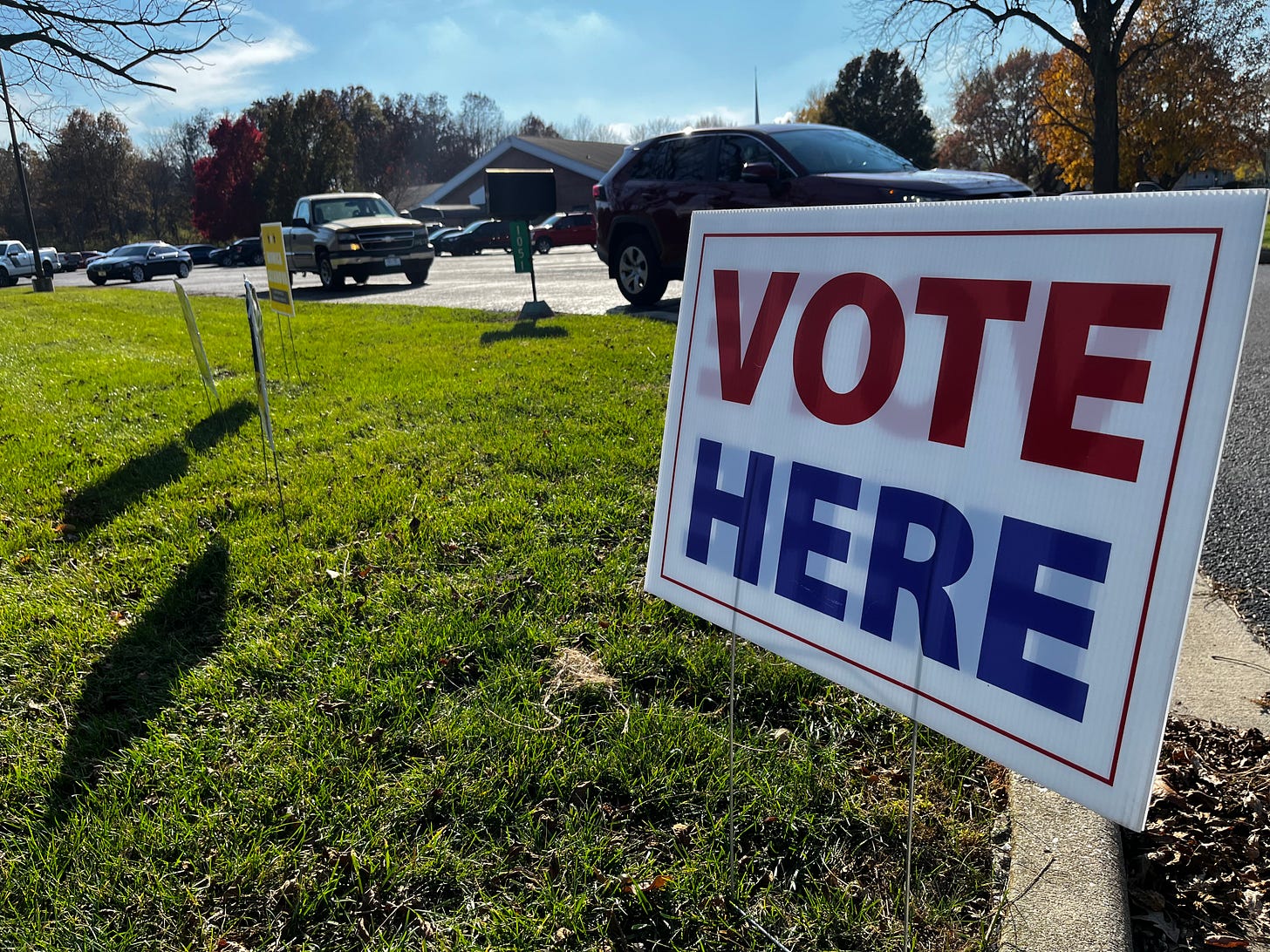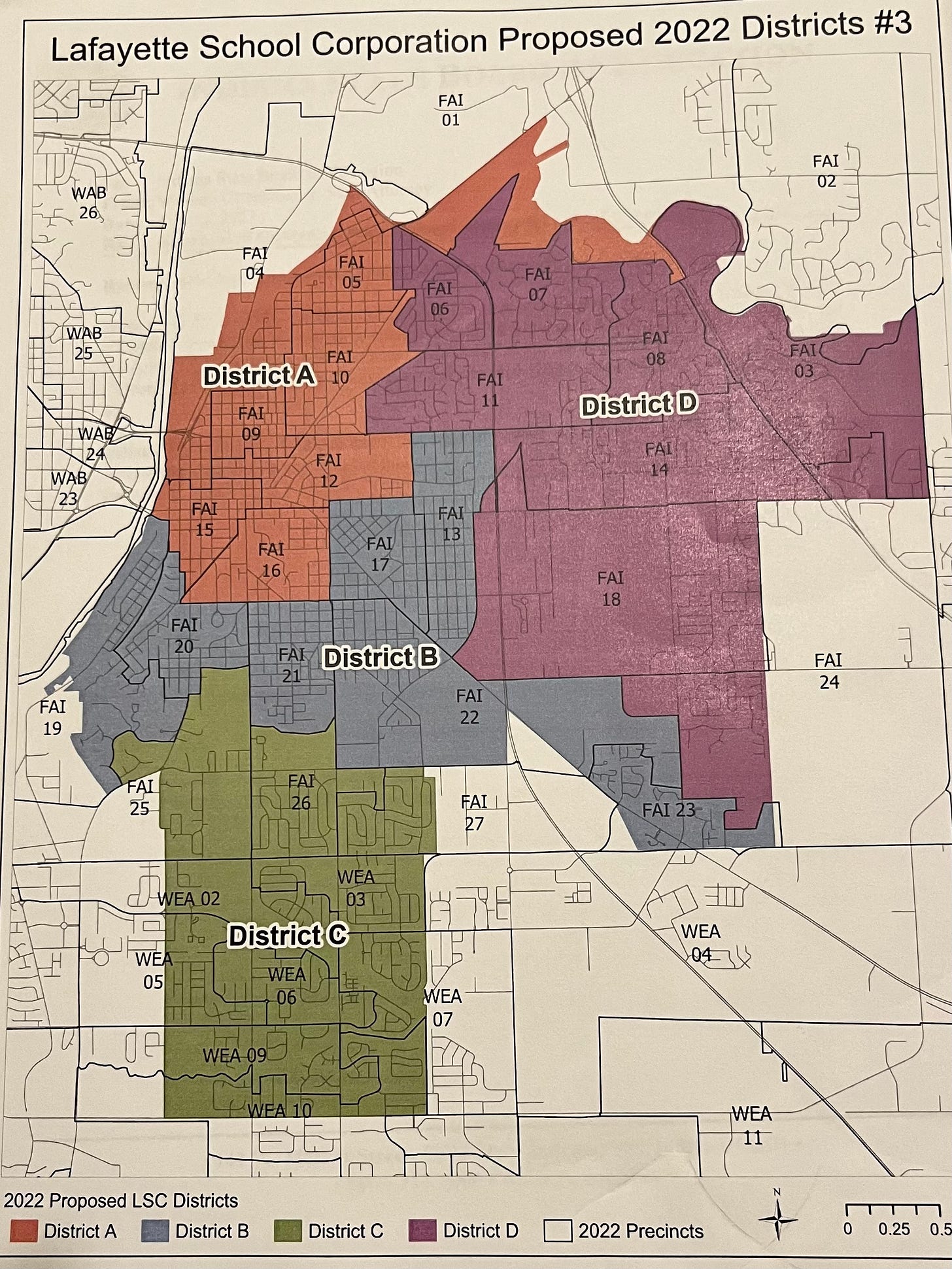Early voting trimmed, again, for '23 city elections
Election Board calls shorter early election hours right-sizing, won’t continue in 2024. Plus, Purdue Trustees OK nursing/pharmacy building, tenure plan for IUPUI profs, new name for online law school
Thanks to the Long Center for the Performing Arts for sponsoring today’s edition. Long Center’s summer series at Loeb Stadium continues Thursday, Aug. 17, with country singer Scotty McCreery on his Damn Strait Tour. Tickets on sale now, at www.longpac.org, the Long Center box office at 111 N. Sixth St. or by calling 765-742-5664.
MUNICIPAL ELECTION UPDATES … IF YOU’RE FOLLOWING ALONG
Not that you’re making plans about where and when to vote this early, but this year’s municipal elections will feature a shortened early voting season ahead of the Nov. 7 Election Day, the Tippecanoe County Election Board agreed last week.
Early voting will start Oct. 23 and include 12 days at the election offices at the Tippecanoe County Office Building in downtown Lafayette. There also will be three-day runs at three satellite sites – yet to be named – in an election that features a relatively small collection of contested city council and town board races in Lafayette, West Lafayette and surrounding communities.
“It’s what you’d call right-sizing,” Mike Smith, an election office staffer, said.
The county made similar moves in a May primary that included a single city council race in West Lafayette that drew less than 4% turnout of eligible registered voters.
The general election includes races with the mayor, city clerk, city judge and three of the nine city council seats uncontested in West Lafayette. In Lafayette, Mayor Tony Roswarski faces a challenge from Libertarian Benji Milanowski, but six of the nine city council seats and city clerk’s position are uncontested.
Randy Vonderheide asked if this would be a trend, with limited early election times, that would continue into the 2024 presidential election year.
“No way,” Smith said. “We’ll be all hands on deck in 2024. We’ll be back to full throttle, then.”
Purdue student ID update: During last week’s election board meeting, Vonderheide also asked for an update about how the county was preparing polls for Purdue’s new mobile student IDs. The answer: Things are in motion to make sure that doesn’t keep students from voting, particularly when high numbers are expected in the 2024 election.
Incoming students in Purdue’s fall 2023 semester will no longer get a physical student ID, instead getting a mobile ID to upload to their phones and other devices. While those will work in dining courts, the Co-Rec and other campus functions, they won’t meet state voting laws that require a physical form of identification that includes an expiration date.
When Purdue made the move to mobile IDs, the university lined up ways for a student to a hard copy for $3 at the Purdue ID card office. The card would contain no strip and no technology for university services, but it would meet state law for voting purposes. Previously, Purdue student IDs met requirements under the state’s voter ID law.
Melissa Gruver, senior associate director for Student Leadership & Civic Engagement at Purdue, said the university was lining up card printing machines for polling places on campus, so students registered to vote in Tippecanoe County could get a vote-ready ID on the spot.
She said her office was looking for ways to absorb that $3 cost so no student felt as if they were turned away on Election Day. Ahead of that, Gruver said the university would be working to spread the word with students about what sort of ID they’d need to bring to the polls.
“So, is it fair to say Purdue sees this coming?” Vonderheide asked.
Gruver said it was.
In other business, the Election Board:
Formally put the renewal of the West Lafayette school property tax referendum on the November ballot. The proposed referendum to continue a 37-cent property tax would raise a bit more than $7 million a year – roughly 18% of the district’s overall budget – for the next eight years, with a stated purpose of “retaining and attracting teachers and staff and funding academic programming and operating expenditures.” Voters approved a similar question in 2017 with more than 90% of the vote. For a closer look at the question and why it will be on the ballot, check this: “WL school board comes together in the end, moves referendum to November ballot.”
Gave final approval to new Lafayette School Corp. school board districts, which will be used for the first time in the 2024 election. The current board setup includes members elected across seven districts. The new maps, determined using 2020 U.S. Census figures, has four board members elected by voters in one of four districts, with the other three elected at-large, LSC-wide. Current LSC board members will finish their current terms as the new system is rolled out in the next two election cycles in 2024 and 2026. Here’s a look at the new LSC school board district map:
Here's what will be on Lafayette and West Lafayette ballots: (Incumbents noted with an asterisk.)
Lafayette
Mayor: Tony Roswarski*, D; Benji Milanowski, Libertarian
Clerk: Cindy Murray*, D.
Council District 1: Jerry Reynolds*, R.
Council District 2: Eileen Hession Weiss*, D; Mary Fisher, R.
Council District 3: Perry Brown*, D.
Council District 4: Lauren Ahlersmeyer*, D; Josiah Eller, Libertarian
Council District 5: Melissa Weast Williamson*, D.
Council District 6: Bob Downing*, D; Perry Barbee, R
Council at-large (3 seats): Kevin Klinker*, D; Nancy Nargi*, D; Steve Snyder*, D.
West Lafayette
Mayor: Erin Easter, D.
Clerk: Sana Booker*, D.
City Judge: Lori Sabol*, D.
Council District 1: Aaron Abell, R; Laila Veidemanis, D.
Council District 2: Michelle Dennis, D.
Council District 3: Colin Lee*, D.
Council District 4: Larry Leverenz*, D.
Council District 5: Kathy Parker*, D; James Waters, R.
Council District 6: Jeff Brown*, R; Stacey Baitinger Burr, D.
Council at-large (3 seats): James Blanco*, D; Iris O’Donnell Bellisario, D; David Sanders*, D; Brian Russell, R; Patrick Flannelly, R.
To register to vote or to check your voter registration status: Go to the Secretary of State’s portal at www.indianavoters.com.
MORE FROM FRIDAY’S PURDUE TRUSTEES ACTION …
In addition to plans for an $11.8 million Purdue Airport terminal expansion to help lure commercial passenger flights and a nearly-900-bed Hillenbrand South residence hall, here’s more of what Purdue trustees discussed Friday:
PHARMACY/NURSING COLLABORATION MOVES FORWARD: In the works for six years, a combined School of Nursing and College of Pharmacy mash-up facility will break ground in September 2024 and be ready for classes and research in October 2026. Trustees on Friday gave the go-ahead on the $160 million, 186,000-square-foot Nursing and Pharmacy Education Building, which will go near the southwest corner of Mitch Daniels Boulevard and South Russell Street. The project includes $89 million from the new state budget, as well as $45 million in anticipated gifts. The building is expected to support Purdue’s plans to increase enrollment in pharmacy and nursing programs, hoping to consolidate related instruction and research needs for both disciplines.
ONLINE LAW SCHOOL CHANGES NAME TO PICK UP PURDUE BRAND: As the Concord Law School, Purdue Global’s online law school, works to get Indiana to allow graduates to take the state’s bar exam, Purdue trustees on Friday agreed to change the school’s name. It will be known as Purdue Global Law School. Martin Pritikin, dean of Concord, said the name of was chosen arbitrarily 25 years, presumably, to tie the online school to New England in some way. Pritikin said Concord Law School became part of Purdue Global in 2018 but held off on a name change.
“We think now is the time for a couple of reasons,” Pritikin said. “One, Purdue Global, itself, has just undergone a major rebranding. If there’s a time for us to align ourselves better with that, we think now is a good time to do that. Obviously, the Purdue name is a highly respected name in the Midwest and throughout the nation and beyond. We think that having the Purdue Global name more prominent in our name and our logo will benefit us long term.”
The law school, which graduates about 50 to 60 a year, petitioned the Indiana Supreme Court in 2022 to allow graduates to qualify to take the state’s bar exam, despite that fully online law schools are ineligible for American Bar Association accreditation. Pritikin said one of the conditions, if the high court’s approval comes, will be for a name change and that the justices are interested in something that has an Indiana connection.
For a good read and overview of those stakes, Indiana Citizen reporter Marilyn Odendahl has been following Concord’s attempt to get its graduates qualified for the Indiana Bar Exam. The latest:
This, from June, looking at Concord’s bar exam rates in California: “Concord Law School posts record bar passage while hoping for admission from Indiana Supreme Court.”
And this, from March, looked at the issues facing Concord’s request: “A new law school via Purdue? Backers of Purdue proposal say it will foster civic health by expanding legal representation. Critics worry about lower standards.”
IUPUI AND TENURE TRACK: Purdue trustees on Friday laid out a plan for tenured and tenure-track faculty at IUPUI to get the same status when they move into the Purdue University Indianapolis campus, when Purdue and IU finalize the separation of their joint university in Indy.
Purdue President Mung Chiang said faculty members – about 70 to 80 – who are scheduled to be transferred out of the IUPUI system and into seven Purdue departments in Indianapolis would maintain their same rank, title, compensation, normal teaching assignments within the discipline, normal research resources and ability to supervise graduate students.
“All of the above will remain the same come July 1, 2024,” Chiang said.
Chiang said that despite the fact that current tenure was approved by IU, Purdue committed to one of two ways for those professors to keep their status. One would be going through the typical three-step process of departmental, school and college review before reaching trustees in April. Chiang said that any of the IUPUI staff that doesn’t clear one of those steps for Purdue tenure, a separate Purdue-Indianapolis tenure status would be created to accommodate them. Trustees voted unanimously to adopt that structure.
OTHER READS …
J&C reporter Ron Wilkins had details of a Friday homicide in the 2000 block of Roosevelt Street, on Lafayette’s north end, where Jordan Angel Lee Loveall, 21, of Lafayette, was killed during a robbery attempt that police reported was a planned drug deal. Police reported that two Texas men, David Trevino, 21, and Adrian Suarez, 23, had been arrested by early Saturday. Police reported Saturday that Trevino and Suarez were in Lafayette on a temporary job assignment. Here are more details from Wilkins’ report: “21-year-old man killed in North End shooting.”
New York Times reporters Cecilia Kang and Ana Swanson took a look at Indiana’s play to go big in the semiconductor world – something that touches Greater Lafayette in a number of ways, from the plans for SkyWater Technology to plant its $1.8 billion operation in Purdue’s Discovery Park District to state notions to pull millions of gallons of water a day from Tippecanoe County to feed development 45 minutes away in Boone County. (Note: The NYT article talks about Purdue’s big role in semiconductor dreams. It also brings up Indiana’s “ample land and water — which are necessary for large chip factories that use water to cool equipment and rinse silicon wafers,” but not so much about the Indiana Economic Development Corp.’s ongoing water pipeline study.) Here’s the report in Aug. 6 editions: “Indiana Tests if the Heartland Can Transform Into a Chip Hub: The state has little experience with semiconductors, but the Biden administration has promised to unleash opportunity in ‘the heartland of America’ through the $52 billion CHIPS Act.”
Indianapolis Star reporter Claire Rafford had news that the state budget committee on Friday approved $120 million for the Indiana Economic Development Corp. to close a deal to bring a $3.2 billion auto manufacturing facility. The IEDC was cagey about what company it was or where the plant would go, saying only that it would be in “north-central Indiana” and not in the developing LEAP District near Lebanon. The facility is expected to generate 1,400 jobs. (Private discussions with Greater Lafayette leaders didn’t indicate that plant would be in Tippecanoe County.) As the state waits, here’s Rafford’s report: “State panel OKs $120M for $3.2B auto manufacturing facility.” Indiana Capital Chronicle reporter Casey Smith also was there and had this about a deal still under wraps: “Indiana budget committee OKs $120M IEDC request for hushed auto manufacturing facility project.”
Thanks, again, to the Long Center for the Performing Arts for sponsorship help with today’s issue. For a rundown of shows at Long Center and Loeb Stadium, go to www.longpac.org.
THANK YOU FOR SUPPORTING BASED IN LAFAYETTE, AN INDEPENDENT, LOCAL REPORTING PROJECT. FREE AND FULL-RIDE SUBSCRIPTION OPTIONS ARE READY FOR YOU HERE.
Tips, story ideas? I’m at davebangert1@gmail.com. Like and follow Based in Lafayette on Facebook: Based in Lafayette








From the linked article:
"Concord posted a record pass rate of 62% among first-time takers of the California bar in the February. This is same as the first-time pass rate for Indiana’s February bar...“We can essentially perform as well or better than ABA (accredited) schools and do it completely online for a third of the cost"
Also from the linked article:
"Concord’s February pass rate came from just 13 graduates taking the California bar. By comparison, 169 individuals took the Indiana exam in February."
According to their own documentation (linked below) they had 220 students in their incoming first-year class in 2020. Only 13 in that class took the bar exam? I guess this makes sense inasmuch as they're offering their curriculum online nationally but are only accredited in California, but it seems really disingenuous for them to be claiming same outcomes for a third of the cost. Their high attrition rate seems to indicate they're admitting a lot of people who end up borrowing money to attend and never make it out of their first year, while another chunk of people borrow money to attend and never end up taking the bar exam, let alone passing it. This seems particularly significant in light of the opening paragraph of the Wikipedia page for Valparaiso Law School:
"In October 2016, the ABA censured the school for admitting applicants who did not appear capable of satisfactorily completing the school's program of legal education and being admitted to the bar.[3] One year later, the school suspended admissions[4][5] and shut down after the last class graduated in 2020."
How does Concord (now Purdue Global) Law School meaningfully differ from this description?
https://www.concordlawschool.edu/documents/business-and-professions-code-6061.7-disclosure.pdf
Oh good. Another dilution of the Purdue reputation. Thanks, Mitch!